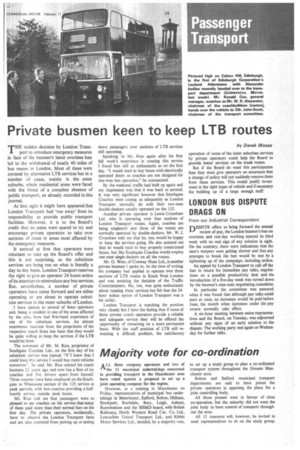Passenger Transport
Page 41

If you've noticed an error in this article please click here to report it so we can fix it.
Private busmen keen to keep LTB routes
by Derek Moses
THE sudden decision by London Transport to introduce emergency measures in face of the busmen's latest overtime ban led to the withdrawal of nearly 40 miles of bus routes in London. Most of these were covered by alternative LTB services but in a number of cases, mainly in the outer suburbs, whole residential areas were faced with the threat of a complete absence of public transport, as already recorded in this journal.
At first sight it might have appeared that London Transport had `run away' from its responsibility to provide public transport facilities. However, it is to the Board's credit that no pains were spared to try and encourage private operators to take over sections of route in areas most affected by the emergency measures.
It seemed at first that operators were reluctant to take up the Board's offer and this is not surprising, as the substitute services are being run on what is literally a day to day basis. London TransPort reserves the right to give an operator 24 hours notice of its intention to reintroduce any bus services. But, nevertheless, a number of private operators have come forward and are either operating or are about to operate substitute services in the outer suburbs of London.
I have spoken to several of these operators and, being a resident in one of the areas affected by the cuts, have had first-hand experience of one of the substitute services. An almost unanimous reaction from the proprietors of the respective coach firms has been that they would be quite willing to keep the services if the LTB would let them.
The comment of Mr. M. Rice, proprietor of Southgate Coaches Ltd., on the first day of his substitute service was typical. "If I knew that I could keep this service I would buy more vehicles tomorrow-. he said. Mr. Rice started his coach business 24 years ago and now has a fleet of six coaches and five drivers apartfrom himself. Three coaches have been employed on the Southgate to Whetstone section of the 125 service at peak periods, with two coaches providing a halfhourly service outside peak hours.
Mr. Rice told me that passengers were so pleased to see coaches on the service that many of them paid more than their normal fare on the first day. The private operators, incidentally, have to observe the London Transport fares and are also restricted from picking up or setting down passengers over sections of LTB services still operating.
Speaking to Mr: Rice again after his first full week's experience in running this service I found him still as enthusiastic as on the first day. "I would need to buy buses with electrically operated doors as coaches are not designed for one-man bus operation," he commented.
By the weekend, traffic had built up again and my impression was that it was back to normal. It was very significant however that Southgate Coaches were coping as adequately as London Transport normally do with their two-man double-deckers usually operated on the 125.
Another private operator is Lewis Cronshaw Ltd. who is operating over four sections of London .Transport routes. Again, coaches are being employed and three of the routes are normally operated by double-deckers. Mr. W. J. Cronshaw told me that he, too, would be happy to keep the services going. He also pointed out that he would need to buy properly constructed buses, but like Southgate Coaches would employ one-man single-deckers on all the routes.
Mr. G. West, of Conway Hunt Ltd., is another private busman I spoke to. At the time of writing his company had applied to operate over three sections of LTB routes in South West London and was awaiting the decision of the Traffic Commissioners. He, too, was quite enthusiastic about running these services but felt that the 24hour notice option of London Transport was a bit unfair.
London Transport is watching the position very closely but I have the feeling that if some of these private coach operators provide a reliable and adequate service they will be offered the opportunity of remaining on a more permanent basis. With the staff position of LTB still remaining a difficult problem, the satisfactory operation of some of the outer suburban services by private operators could help the Board to provide better services on the trunk routes.
But if the Board do want this participation then they must give operators an assurance that a change of policy will not suddenly remove them from these services. This would justify investment in the right types of vehicle and if necessary the building up of a large enough staff.




























































































































